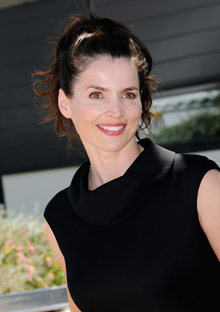
Photo: Tony Barson/WireImage.com
The actress revisits memoirs, reportage, and an entrancing novel that transported her to other places—literally: savannas in Kenya, villages in India, and a spiraling Russian staircase.
What I look for in a book is something that feels honest, that illuminates the human experience. It's remarkable when someone can bring you into their world and their thought process and their emotional life in an uncensored way. Those books are the ones that stick. I love books that connect me to reality, that provoke me to go see the world they've described—which happened with almost all my choices on this list. After reading one memoir, I ended up in Kenya doing flights with bush pilots. A Russian novel led me not just to the art museums of Moscow but to the author's home, and to an extraordinary staircase. One account of slavery took me to Lake Volta in Ghana and to villages in India (and led me to start an advocacy group that works to eradicate slavery).
It's then, when I'm in one of these places, that I realize how vital and necessary it is for us to share our stories.
— As told to M Healey
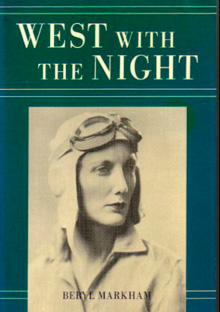
West with the Night
By Beryl Markham
A lot of people know about Amelia Earhart, but few have heard of aviator Beryl Markham. Her parents were Europeans who settled in Africa. She emerges into adulthood very independent—she's described as a white woman with an African heart. When the love of her life goes to England, she announces that she's going to pilot a plane to London to see him. She's welcomed as a hero because she's the first woman to have flown from Africa to Europe. After her lover marries, she makes the first crossing west from England to North America—a flight that was believed to be impossible. West with the Night eventually took me to Kenya: I spent a month researching Markham's life for a potential film, meeting people who knew her, flying with bush pilots over zebras and hippos and rock formations.
By Beryl Markham
A lot of people know about Amelia Earhart, but few have heard of aviator Beryl Markham. Her parents were Europeans who settled in Africa. She emerges into adulthood very independent—she's described as a white woman with an African heart. When the love of her life goes to England, she announces that she's going to pilot a plane to London to see him. She's welcomed as a hero because she's the first woman to have flown from Africa to Europe. After her lover marries, she makes the first crossing west from England to North America—a flight that was believed to be impossible. West with the Night eventually took me to Kenya: I spent a month researching Markham's life for a potential film, meeting people who knew her, flying with bush pilots over zebras and hippos and rock formations.
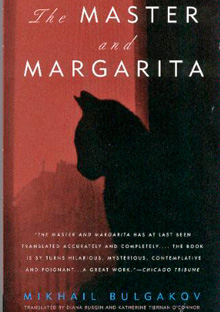
The Master and Margarita
By Mikhail Bulgakov
I filmed three projects in Russia, and I found the people to be a mystical bunch. They discuss their writers and the arts in a way that is very full-blooded. I love this novel because it so captures the essence of what it is to be Russian. One of my favorite places in the world is the long, winding staircase leading to Bulgakov's apartment in Moscow; every inch of it is covered in graffiti. The Soviet authorities censored his book and kept painting over the graffiti as a way of suppressing people's memory of him, but each time, even though it was risky, Russians would write more. Bulgakov's book and that staircase are spectacular examples of how the heart of a people is separate from the authorities who may attempt to rule it.
By Mikhail Bulgakov
I filmed three projects in Russia, and I found the people to be a mystical bunch. They discuss their writers and the arts in a way that is very full-blooded. I love this novel because it so captures the essence of what it is to be Russian. One of my favorite places in the world is the long, winding staircase leading to Bulgakov's apartment in Moscow; every inch of it is covered in graffiti. The Soviet authorities censored his book and kept painting over the graffiti as a way of suppressing people's memory of him, but each time, even though it was risky, Russians would write more. Bulgakov's book and that staircase are spectacular examples of how the heart of a people is separate from the authorities who may attempt to rule it.
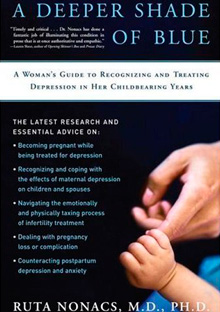
A Deeper Shade of Blue
By Ruta Nonacs, MD, PhD
This book demystified depression for me, and it helped me fathom why pregnancy and birth, things we traditionally understand as happy events, can trigger such devastating feelings in a mother. A lot of people spend a ton of time looking into birth classes, learning to breathe, and the rest of it, but I was shocked by what happened after I gave birth. I didn't have postpartum depression, but I do wish someone had said, "This is how tricky the recovery is.... This is how tired you're going to be.... Don't be thrown by the hormonal ups and downs."
By Ruta Nonacs, MD, PhD
This book demystified depression for me, and it helped me fathom why pregnancy and birth, things we traditionally understand as happy events, can trigger such devastating feelings in a mother. A lot of people spend a ton of time looking into birth classes, learning to breathe, and the rest of it, but I was shocked by what happened after I gave birth. I didn't have postpartum depression, but I do wish someone had said, "This is how tricky the recovery is.... This is how tired you're going to be.... Don't be thrown by the hormonal ups and downs."
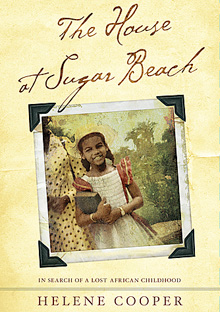
The House at Sugar Beach
By Helene Cooper
In this memoir, Cooper, who was born in Liberia, takes you through the history of her country, the first independent African nation. She tells of her childhood naïveté about her privileged social position, and of her relationship with Eunice, a poor country girl her parents took in. When political tensions erupted in Liberia, Cooper's family immigrated to America, leaving Eunice behind. Cooper grew up to become a journalist, but she carried the burden of her past silently, because Americans, she felt, wouldn't understand. She eventually returned to Liberia to find Eunice. There's no cutesiness: It's a vivid personal account—honest, raw, uncensored, and often very funny.
By Helene Cooper
In this memoir, Cooper, who was born in Liberia, takes you through the history of her country, the first independent African nation. She tells of her childhood naïveté about her privileged social position, and of her relationship with Eunice, a poor country girl her parents took in. When political tensions erupted in Liberia, Cooper's family immigrated to America, leaving Eunice behind. Cooper grew up to become a journalist, but she carried the burden of her past silently, because Americans, she felt, wouldn't understand. She eventually returned to Liberia to find Eunice. There's no cutesiness: It's a vivid personal account—honest, raw, uncensored, and often very funny.
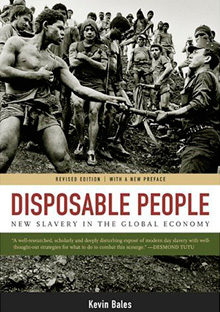
Disposable People
By Kevin Bales
When I became a UN spokesperson on slavery, I asked the program administrators to give me a list of books I should read to get a grasp of the problem. Kevin Bales, a professor at Roehampton University in London, is widely viewed as the world's expert on modern-day slavery. His book gave me a global perspective on how this issue goes way beyond sex trafficking. It's tricky to link the dots, how it affects us, but Bales takes you through the complexities in a readable way. He writes about some villages in India where people have been enslaved for generations. He also includes positive stories: One nonprofit organization in India is helping women pay off their families' debt and raise themselves out of poverty. After reading this, I said, "Okay, I want to meet those people." Going on that journey—I also went to Ghana, where I talked with potential slave kids and traffickers—is very much why I worked to set up asset.
More Books That Made a Difference
By Kevin Bales
When I became a UN spokesperson on slavery, I asked the program administrators to give me a list of books I should read to get a grasp of the problem. Kevin Bales, a professor at Roehampton University in London, is widely viewed as the world's expert on modern-day slavery. His book gave me a global perspective on how this issue goes way beyond sex trafficking. It's tricky to link the dots, how it affects us, but Bales takes you through the complexities in a readable way. He writes about some villages in India where people have been enslaved for generations. He also includes positive stories: One nonprofit organization in India is helping women pay off their families' debt and raise themselves out of poverty. After reading this, I said, "Okay, I want to meet those people." Going on that journey—I also went to Ghana, where I talked with potential slave kids and traffickers—is very much why I worked to set up asset.
More Books That Made a Difference




